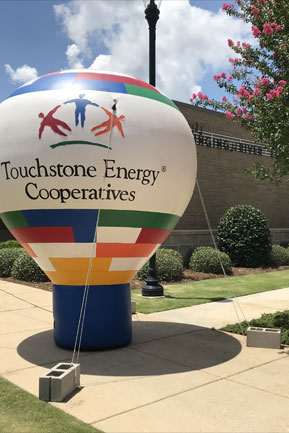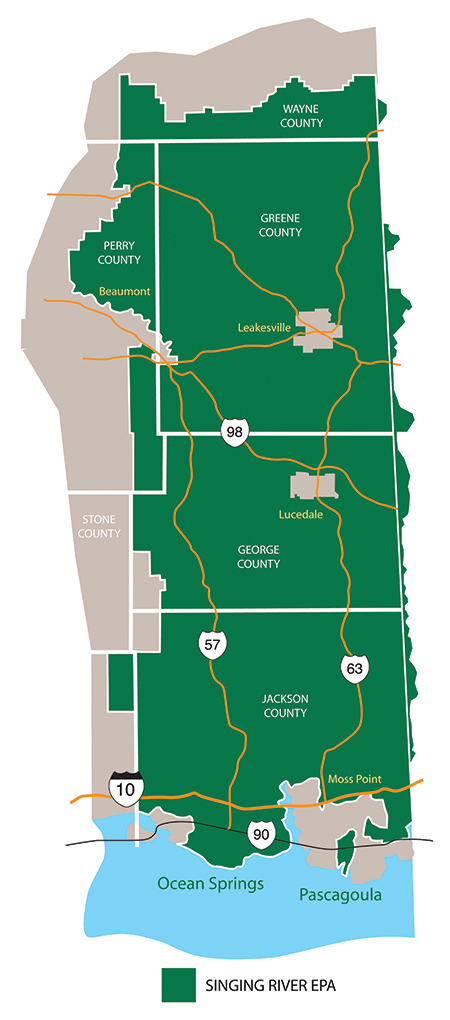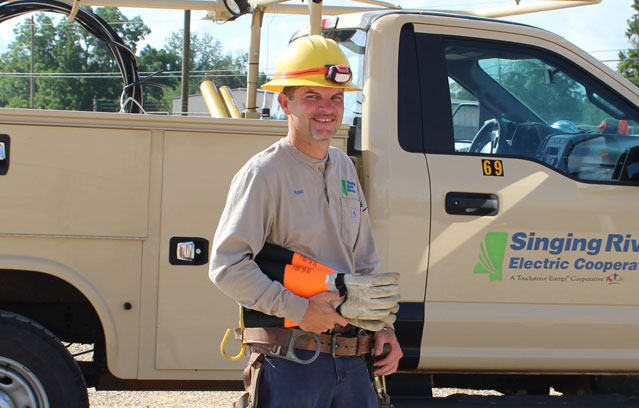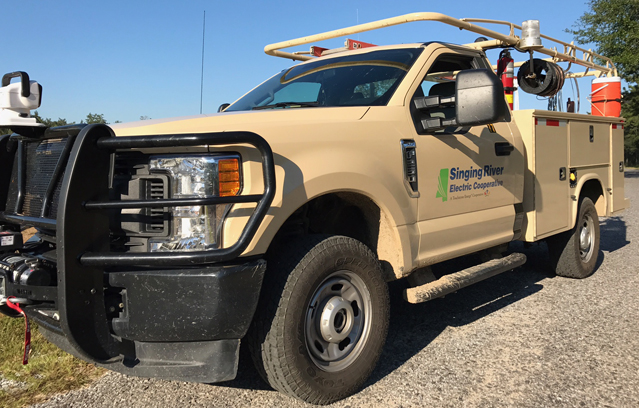My Co-op
What is an electric cooperative?
Singing River Electric Leadership
Staff:
Brian Hughey, General Manager, and CEO
Jeff Catlett, Sand Hill District Manager
Stephanie Chisholm, Executive Assistant Tom Davis, Director of Engineering
Nick DeAngelo, Manager of Business Operations
Jason Havard, Manager of Safety
Amanda Parker, Manager of PR & Marketing
Tammy Hultz, Chief Financial Officer
John Mason, Manager of Engineering
Robb Smith, Manager of Information Technology
Courtney Weatherford, Manager of Human Resources
Board of Directors:
Singing River Electric is represented by a board of directors made up of members from throughout the service territory. These directors help manage the business and affairs of the electric distribution cooperative.
KRISTAL SISSON, PRESIDENT, Educator, District 3
RONALD R. WILSON, VICE PRESIDENT, Retired Shipyard Director and Engineer, District 2
CARY E. WILLIAMS, TREASURER, CPA/Financial Planner, District 1
EDWARD H. THORNTON, SECRETARY, Retired Business Owner, District 3
ROBERT STEELE, COOPERATIVE ENERGY BOARD REPRESENTATIVE, Retired Business Owner, District 1
TRAVIS BAXTER, Retired Shipyard Supervisor, District 2
STANLEY R. BUSBY, Greene County maintenance supervisor, District 1
HOWARD DAVIS, Retired Civil Engineer, District 3
ROY GRAFE, Retired Mechanical Engineer, District 2
MARK W. LASALLE, Biologist, District 3
AMANDA SEYMOUR, Board Attorney
Want to connect with your board? Email board@singingriver.com.
Please see SRE Bylaws for information on board candidacy and elections. A director candidate packet must be completed and returned to the Co-op during the director qualification period, which is normally in January and February each year. Each director serves a term of three years and represents one of three geographical areas. Directors are elected at the Annual Membership Meeting held in June.
You can also reference the January and February Today in Mississippi magazine issues that are mailed directly to members for board candidacy deadline information and the May and August issues for information on how to vote, the date of the Annual Membership Meeting and results from the meeting.

The Cooperative Difference

For more than 80 years, Singing River Electric Cooperative has provided quality and reliable electric service to its members. We are the second largest cooperative in Mississippi and the 49th largest of 809 electric co-ops in the nation.
Our mission is to provide safe and reliable electric service at the lowest possible cost while promoting energy efficiency and enhancing the lives of the members and communities we serve.
As a cooperative, we operate by the seven cooperative principles:
Cooperatives are voluntary organizations, open to all persons able to use their services and willing to accept the responsibilities of membership, without gender, social, racial, political or religious discrimination.
Cooperatives are democratic organizations controlled by their members, who actively participate in setting their policies and making decisions. Men and women serving as elected representatives are accountable to the general membership. In primary cooperatives, members have equal voting rights – one member, one vote.
Members contribute to, and democratically control, the capital of their cooperative. At least part of that capital is usually the common property of the cooperative. Members allocate surpluses for any or all of the following purposes: developing the cooperative, possibly by setting up reserves, part of which at least would be indivisible; benefiting members in proportion to their transactions with the cooperative; and supporting other activities approved by the membership.
Cooperatives are autonomous, self-help organizations controlled by their members. If they enter into agreements with other organizations, including governments, or raise capital from external sources, they do so on terms that ensure democratic control by their members and maintain their cooperative autonomy.
Cooperatives provide education and training for their members, elected representatives, managers and employees so they can contribute effectively to the development of their cooperatives. They inform the general public – particularly young people and opinion leaders – about the nature and benefits of cooperation.
Cooperatives serve their members most effectively and strengthen the cooperative movement by working together through local, national, regional and international structures.
While focusing on member needs, cooperatives work for the sustainable development of their communities through policies accepted by their members.
Energizing Economic Development
Singing River Electric is committed to economic development as an important way of improving the communities we serve. We support our local economies and work to create new jobs in two ways: building infrastructure necessary to reliably support our business and industry needs both today and tomorrow, and working aggressively to match local economic development projects with U.S. Department of Agriculture rural development loans and grants.
Your Co-Op Energy Resources
Generation Resources
Cooperative Energy relies on a mix of resources to keep overall energy costs low.
Our generation mix includes natural gas, coal, nuclear, hydro electric and solar.
Generating Electricity
Cooperative Energy is ever ready to provide electricity, 24/7 and 365 days a year.
Ever wonder how your electricity works? Or where it comes from? Here’s some information that might enlighten you.
Transmitting Electricity
Power highways carry electricity throughout Mississippi.
Cooperative Energy’s bulk wholesale power is delivered via more than 1,755 miles of transmission lines. Singing River Electric then takes the power from substations to your home over 7,500+ miles of underground and overhead power lines.
Through the Woods
In Mississippi, transmission and distribution power lines are built through long stretches of forests and woodlands, as well as across swamps, rivers and bayous.
Reliable Service
Right-of-way easements are on yearly maintenance rotations to ensure limbs and shrubs are re-cleared and do not come in contact with power lines and cause outages.
Under Constant Evaluation
Because member demand is ever increasing, both transmission and distribution systems are monitored and maintained daily. Long-term and short-term engineering plans are made and followed to plan for future growth.
Distributing Electricity
Here’s the journey from generator to meter:

Energy Fuel Source Mix
Over the past 16 years, electric energy resources for Singing River Electric members have shifted dramatically. In 2005, coal was the dominant fuel source making up 56% of all power consumed. Natural gas followed at a distant 28%. By 2021, natural gas replaced coal as the dominant fuel source with a 74% share of the generation mix. These charts show the shifting resources.
Renewable energy is a growing source of generation. Cooperative Energy, SRE’s generation and transmission partner, owns nine small-scaled solar sites across the state with a combined capacity of 900 kilowatts. They also have a power purchase agreement with a 52-megawatt solar site in Lamar County and a 100 MW solar site in Carrol County slated to open in 2022. They also receive wholesale hydropower from several reservoirs and dams in Georgia.
2005 Energy to Members
2021 Energy to Members
Solar is already in the mix!
Did you know solar is part of Cooperative Energy's generation mix? That means you are already benefitting from this renewable resource. If you would like to add solar to your home, we can help. Talk to us before installation.
Annual Membership Meeting
SREC Geographic Districts
District 1 directors represent members in Greene, Perry, Wayne counties in Mississippi and Washington County in Alabama. Three directors are elected and hold office from this district in posts 1, 2, and 3.
District 2 directors represent members in George and Stone counties in Mississippi and Mobile County in Alabama. Three directors are elected and hold office from this district in posts 1, 2, and 3.
District 3 directors represent members in Jackson and Harrison counties in Mississippi. Four directors are elected and hold office from this district in posts 1, 2, 3, and 4.
Contact Us
If you have any service or billing related questions or comments, you can text a SRE MSR at 228-591-9166, message us through the SmartHub app, call any SREC office, or email us at: contactus@singingriver.com. Our mailing address is P.O. Box 767, Lucedale, MS 39452.
Office and call center hours for all locations are M-F 8:00 a.m. to 5:00 p.m.
Lucedale Office
(Headquarters)
11187 Old 63 South
Lucedale, MS 39452
(601) 947-4211
Map to this location.
Gautier District
Office
500 Highway 90
Gautier, MS 39553
(228) 497-1313
Map to this location.
Sand Hill District
Office
39276 Highway 63N
Richton, MS 39476
(601) 989-2345
Map to this location.
Affiliates
Electric Cooperatives of Mississippi (ECM) represents 26 electric power associations in the state, which deliver electricity to 1.7 million Mississippians. The statewide trade organization assists co-ops with issues involving safety, training, communications (including publishing “Today in Mississippi”), and legislative matters. ECM also coordinates the annual Youth Leadership Program and assistance for co-ops during natural disasters.
Cooperative Energy is a generating and transmission cooperative based in Hattiesburg, Mississippi. Cooperative Energy serves more than 390,000 members through its 11 member distribution systems, including Singing River Electric. Singing River Electric purchases all wholesale power from Cooperative Energy.
National Rural Electric Cooperative Association (NRECA) is the national service organization dedicated to representing the national interests of 838 electric cooperative utilities and the members they serve.
America’s electric cooperatives provide electricity to an estimated 42 million people in 47 states. Their service territories, which collectively cover 75% of the U.S. landmass. Distribution cooperatives are the foundation of the rural electric network. They deliver electricity to retail customers. Generation & transmission cooperatives (G&Ts) provide wholesale power to distribution co‑ops through their own generation or by purchasing power on behalf of the distribution members.
In addition to electric service, electric co-ops are deeply involved in their communities promoting development and revitalization projects, small businesses, job creation, improvement of water and sewer systems and assistance in delivery of health care and educational services.
Touchstone Energy Cooperatives represent a nationwide alliance of more than 750 local and member-owned electric cooperatives in 46 states working to supply reliable, affordable and safe energy for its 32 million members every day. By working together, this network of cooperatives that own and service rural America’s 2.5 million miles of power line generate services that would normally require the resources of a national corporation. Today, Touchstone Energy Cooperatives has grown to become America’s largest electric utility network.



